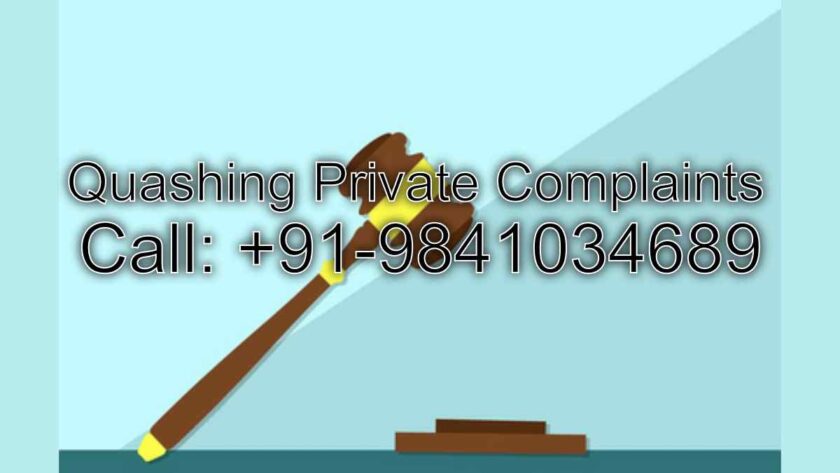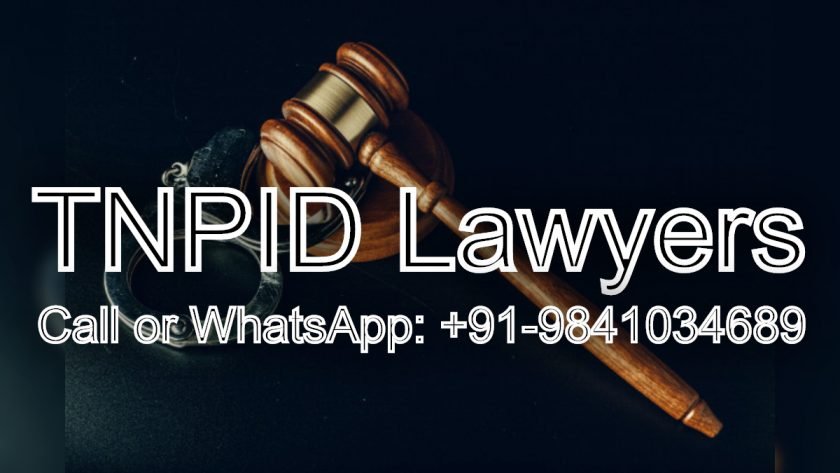In the realm of criminal law, private complaints hold a significant place, often serving as the initial step in initiating legal action against an individual or entity. These complaints, filed by aggrieved parties, trigger a series of legal processes that can have far-reaching consequences. Understanding the nuances of private complaints and the legal mechanisms to address them is vital. This article delves into the world of quashing private complaints, a legal remedy that plays a crucial role in safeguarding individual rights and interests.
Private complaints, by definition, are allegations brought forth by individuals or entities against others for perceived wrongs or offenses. These complaints serve as the foundation for criminal proceedings, potentially leading to investigations, trials, and penalties. In many cases, however, these complaints can be misused or filed with malicious intent, causing undue distress to the accused.
Legal Basis for Quashing Private Complaints
Section 482 of the Code of Criminal Procedure
One of the key provisions that empowers the courts to intervene in such cases is Section 482 of the Code of Criminal Procedure (CrPC). This section grants inherent powers to the High Courts to make orders necessary to prevent the abuse of the legal process. These inherent powers extend to quashing criminal proceedings, including private complaints, when the ends of justice so demand.
Furthermore, the courts have been entrusted with a significant responsibility in ensuring that the legal process is not misused to settle personal scores or harass innocent individuals. This legal safeguard is a cornerstone of the Indian legal system, emphasizing the importance of justice and fairness.
Grounds for Quashing Private Complaints
Lack of Prima Facie Evidence
Firstly, one of the primary grounds for quashing a private complaint is the absence of prima facie evidence. In simpler terms, this means that the complaint lacks the essential elements required to establish a case against the accused. In such instances, the court may deem it fit to quash the proceedings, preventing unnecessary harassment.
Abuse of the Legal Process
Secondly, when a private complaint is filed with the intent of abusing the legal process, it can be a valid ground for quashing. This may involve filing false or frivolous complaints with the sole purpose of causing inconvenience to the accused.
In addition, the courts are vigilant in ensuring that legal mechanisms are not exploited to settle personal vendettas. Quashing such complaints is a measure to maintain the sanctity of the legal system.
Settlement Between Parties
Thirdly, if the parties involved in the private complaint reach an amicable settlement and no longer wish to pursue legal action, the court may consider quashing the proceedings. The objective is to encourage parties to resolve their disputes outside of the courtroom when possible.
Violation of Fundamental Rights
Moreover, if the private complaint violates the fundamental rights of the accused, such as the right to a fair trial or the right against self-incrimination, it becomes a strong ground for quashing. Upholding these rights is paramount in the legal system.
Malicious Prosecution
Additionally, if it can be proven that the private complaint was filed with malicious intent to defame or harm the reputation of the accused, it provides solid grounds for quashing. Courts are vigilant in protecting individuals from baseless allegations.
Other Valid Reasons for Quashing
Furthermore, various other valid reasons may include the absence of jurisdiction, procedural irregularities, or cases where the complaint is time-barred. Each case is unique, and the court assesses it based on its individual merits.
Procedure for Quashing Private Complaints
Drafting and Filing a Quash Petition
To begin with, if an individual or entity wishes to quash a private complaint, they must draft and file a quash petition before the appropriate court. This petition outlines the grounds on which the complaint should be quashed.
Additionally, it is essential to ensure that the petition is well-drafted, clearly presenting the legal arguments and supporting evidence. Legal expertise is often sought to create a compelling case.
Role of the Petitioner and Respondent
Moreover, in the quash proceedings, the petitioner, who seeks the quashing of the complaint, and the respondent, who opposes the quash petition, play distinct roles. The petitioner must provide valid reasons for quashing, while the respondent presents arguments against it.
It’s important to note that the High Court possesses discretionary power in quashing proceedings. This means that the court assesses each case individually and determines whether quashing is warranted based on the facts and circumstances.
Hearing and Decision-Making Process
Furthermore, once the quash petition is filed, the court schedules a hearing. During the hearing, both parties present their arguments and evidence. The court carefully evaluates the merits of the case and makes a decision based on the principles of justice and fairness.
Additionally, the court may choose to quash the entire complaint or specific charges within it, depending on the circumstances. The decision is a culmination of a thorough legal process that upholds the principles of natural justice.
Role of Rajendra Criminal Law Firms
Expertise in Criminal Law
Rajendra Criminal Law Firm, renowned for their expertise in criminal law, play a pivotal role in assisting individuals and entities in quashing private complaints. Their seasoned legal professionals possess an in-depth understanding of the intricacies of criminal proceedings.
Furthermore, the firms have a track record of handling complex cases and securing favorable outcomes for their clients. Their extensive knowledge of criminal law ensures that clients receive the best legal representation.
Experience in Quashing Private Complaints
Additionally, Rajendra Criminal Law Firms have a wealth of experience in quashing private complaints. They are well-versed in the legal provisions and precedents that govern such cases.
It’s worth noting that their expertise extends to various grounds for quashing, allowing them to craft strong arguments in favor of their clients.
Importance of Legal Representation
Why Hiring a Criminal Lawyer Is Crucial
Hiring a criminal lawyer when facing a private complaint is not just advisable; it is crucial. Legal representation ensures that individuals and entities have a dedicated advocate who can safeguard their rights and interests throughout the legal proceedings.
Furthermore, criminal lawyers possess the knowledge and experience required to navigate the complexities of the legal system. They can identify strong grounds for quashing private complaints and present compelling arguments before the court.
Factors to Consider When Hiring a Criminal Lawyer
Experience in Quashing Private Complaints
Firstly, one of the primary factors to consider when hiring a criminal lawyer is their experience in quashing private complaints. An attorney with a successful track record in such cases is well-equipped to handle the complexities involved.
Additionally, assessing their past cases and outcomes can provide valuable insights into their expertise.
Track Record of Successful Quash Petitions
Moreover, a lawyer’s track record of successful quash petitions is a testament to their ability to secure favorable results for their clients. Past success can instill confidence in their legal representation.
Clients should inquire about their lawyer’s achievements in similar cases and seek references if necessary.
Case Study: Successful Quashing of Private Complaint
Detailed Example of a Case
To illustrate the process, let’s delve into a case study where a private complaint was successfully quashed with the assistance of Rajendra Criminal Law Firms. This real-life example sheds light on the intricacies of quashing proceedings.
The case study outlines the steps taken by the law firms, the challenges faced, and the ultimate outcomes for the client.
Frequently Asked Questions (FAQs)
Common Queries Related to Quashing Private Complaints
Many individuals have questions regarding the quashing of private complaints. Addressing these frequently asked questions can provide clarity on the subject.
Here are some common queries and informative answers:
Quashing a private complaint provides legal relief by dismissing baseless cases, protecting the accused’s rights, and ensuring justice by preventing unjust proceedings.
Yes, You can quash a private complaint at any stage of the proceedings if the court finds valid grounds for doing so. The court can quash the complaint if it determines that the complaint is frivolous, lacks legal merit, or if compelling reasons, such as a compromise between the parties, justify terminating the proceedings in the interest of justice. The court holds the discretion to quash the complaint when appropriate, even after the initiation of legal proceedings.
To support a quash petition, evidence such as documents, statements, or legal arguments proving the complaint’s lack of merit, frivolity, or grounds for compromise is required. The type and strength of evidence depend on the case’s legal basis. Consulting an experienced attorney is crucial.
The duration of the quashing process can vary widely depending on factors such as the complexity of the case, the backlog of cases in the court, and the specific legal procedures involved. In some cases, a quashing petition may be resolved relatively quickly, while in others, it could take several months or even longer to reach a conclusion. It is advisable to consult with legal counsel for a more accurate estimate based on the specifics of your case.
Legal Resources for Quashing Private Complaints
Online and Offline Resources
For individuals seeking to understand the legal process of quashing private complaints further, there are a plethora of resources available. These resources, both online and offline, provide valuable insights and guidance.
Online resources include legal websites, forums, and blogs that offer comprehensive information on legal procedures and precedents related to quashing private complaints.
Offline resources encompass books, articles, and legal publications that delve into the nuances of criminal law and court judgments.
Read More
- Unlocking the Power of Quashing: A Comprehensive Guide to Cases You Can Quash in Madras High Court
- Understanding the Different Types of Quash in Legal Proceedings
- Defend Your Rights: Get Legal Services for Human Rights Violation
- Quash a Criminal Case: What is the Meaning and Legal Process?
- Corruption Cases: How to hire a good Criminal Lawyer?
- Justice Behind Bars: Advocacy for Public Intoxication Defense
- Road Safety Matters: Defense against Vehicular Manslaughter Charges
- Hit and Run Defense: Advocacy for Hit and Run Charges
- How to Register a Grievance Against Income Tax Department Officers
Conclusion
In conclusion, the quashing of private complaints is a vital legal remedy that ensures justice prevails. With the support of experienced criminal lawyers, individuals and entities can navigate the complex legal landscape and seek relief when faced with unjust or malicious complaints. Rajendra Criminal Law Firms stand as beacons of legal expertise, guiding clients through the intricacies of quashing proceedings. When it comes to protecting one’s rights and interests, the choice of legal representation is paramount.





